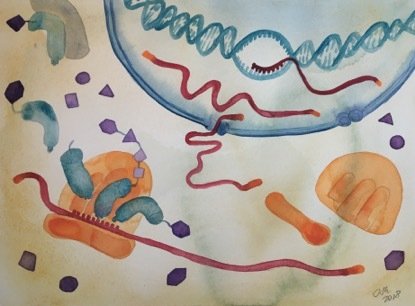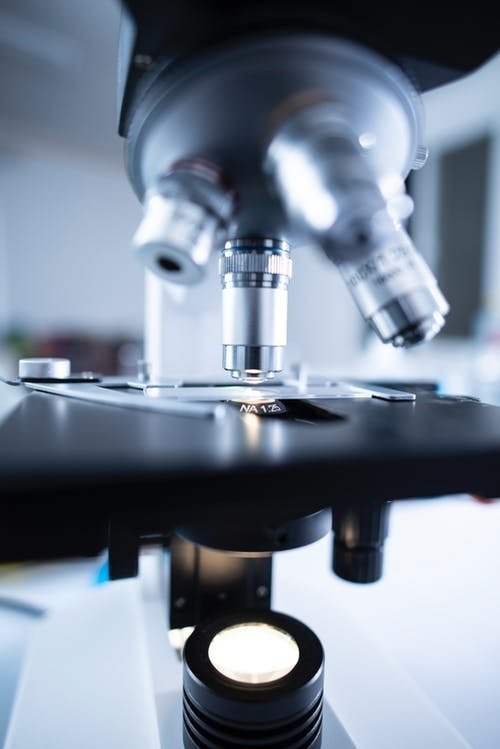Research Focus
Research in our group focuses on identifiying and characterizing the regulatory interdependencies of protein-coding and noncoding RNAs (long noncoding, transfer and small RNAs) transcriptome-wide in mammalian somatic tissues and in the germline. Our goal is to gain mechanistic insights into the transcriptional and post-transcriptional regulation and processing of RNAs during organ development, cell differentiation and disease progression.

Functional interactions of the coding and noncoding part of genomes
Over 200 highly specialized cells with diverse morphologies and functionalities exist in the human body, yet virtually every cell in the body contains the same genetic information. To exert cell-specific functions high fidelity mechanisms evolved to restrict the synthesis and processing of discrete sets of regulatory RNA molecules. Abnormal cell behavior as seen in many fatal human diseases, such as cancer, is often the consequence of aberrant transcripts formation.
Research in our group focuses on identifying and characterizing the regulatory interdependencies of protein-coding and noncoding RNAs (long noncoding, transfer and small RNAs) transcriptome-wide in mammalian somatic tissues and in the germline. Our goal is to gain mechanistic insights into the transcriptional and post-transcriptional regulation and processing of RNAs during organ development, cell differentiation and disease progression.
We are particularly interested in:
- revealing the origin, evolution and disease association of ncRNAs
- deciphering the molecular mechanism underpinning regulation by ncRNAs
- explaining ncRNA functions.
Our experimental approaches include:
- comparative genomics of sequenced vertebrate (including human and mouse) and lately viral genomes
- applying and developing high-throughput bulk and single cell RNA sequencing methodologies (various total and small RNAseq, RBP-RNA interaction) as well as genome (HiChIPseq) and epigenetic profiling (ChIPseq, ATACseq, XDrop target enrichment) coupled to powerful computational analysis (customized tools for quantifying chromatin, polymerase activity, transcript abundance as well as gene regulatory networks) using Illumina and long-read sequencing
- detailed molecular (cloning, Gibson assembly) and biochemical assays as well as complementing screening (Cas13) methodologies
- phenotypic characterization by modifying gene and transcript abundance (CRISPR/Cas9 genomic deletions, CRISPR activation and inactivation) in cell lines and tissues (NEON and lipid-based transfections as well as transductions)
- Most of our sequencing efforts are performed on our Illumina NextSeq 500 and 2000.
We are an integrated team of experimental and computational scientists working in close collaboration to pursue individual research projects. Our group is affiliated to the Department of Microbiolology, Tumor and Cell Biology (MTC) and the Science for Life Laboratory where our laboratory is located.
We interact daily with the research groups of Vicente Pelechano and Marc Friedlander by sharing office/bench space and having weekly joint group meetings and journal club.
Current Research Projects
Explaining how transcriptional “junk” is functional
Despite previous assumption that protein-coding genes are the exclusive carrier of functional information, a significant number of genetic variants linked to human diseases reside in the noncoding part of our genome. Many of these intergenic regions are transcribed into RNA molecules, including long noncoding RNAs.
Although initially disregarded as transcriptional by-products, growing evidences assign important regulatory function to long noncoding RNAs. We identified that transcription of coding and noncoding RNAs is entwined to ensure proper cellular function.
Currently, we investigate the transcriptional dynamics and regulatory processes employed by the cell when undergoing differentiation during development and transformation into cancer cells. We have a particlar interest in the involvement of RNA binding proteins during transcript processing and how they synergize with other cofactors.
Tackling the unique relationship and new roles of “old hats”
Increased transcriptional complexity in human and other higher eukaryotes is controlled by a sophisticated interplay of three RNA polymerases (Pol) that give rise to a variety of transcripts with different functions. For example, Pol II-derived mRNA codons and Pol III-transcribed tRNA anticodons are inevitable linked during translation.
Previously, we have shown that mRNA codon usage is evolutionarily stable but the pool of tRNA anticodons needs to be actively controlled during species evolution, organ development and cancer.
We are continuing to investigate how co-evolution of codons and anticodons is controlled to ensure optimal translational efficiencies. In addition, we have identified new roles of tRNAs and are currently undertaking a multidisciplinary approach to investigate the precise mechanism of tRNA gene evolution, processing and functionality.
Understanding the cell’s manoeuvre to advance vs. preserve functionality
Genomes evolve rapidly. Major contributors to this effect are transposable elements (TE). Although TE repeat sequences constitute up to two thirds of the human genome, we lack knowledge about the underlying regulatory mechanism by which TEs create genomic innovations and at the same time get constrained to preserve genomic integrity.
We found that noncoding RNAs act as essential players in this paradoxical arms race between genome evolvability and stability. At present, we explore how TEs get mobilized and lead to the emergence of genes or alter regulatory processes in diverse vertebrate species and disease settings using a comparative genomics approach.
Research news and activities
 Photo: N/A
Photo: N/AFollow us on X
Support our research
 Photo: Chokniti Khongchum
Photo: Chokniti KhongchumMake a donation to our research at MTC
Your support means a lot to our success. This allows us to go further in our efforts to improve human health through research and education.
Read here how you can make a donation via Swish.
